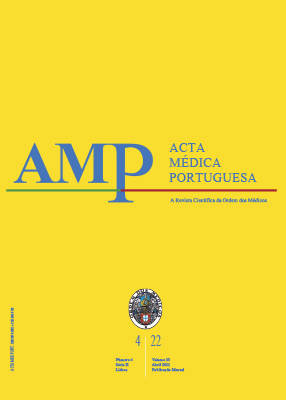Clostridium difficile Severity and Outcome at a North of Portugal Healthcare Facility
DOI:
https://doi.org/10.20344/amp.16357Keywords:
Clostridioides difficile, Clostridium Infections/diagnosis, Clostridium Infections/epidemiology, Risk Factors, Severity of Illness Index, Treatment OutcomeAbstract
Introduction: Clostridium difficile infection has been increasingly reported, with a significant healthcare burden and important morbimortality. This study aimed to characterize and describe the severity and outcomes of this event at a Portuguese hospital.
Material and Methods: We conducted a retrospective analysis, by clinical record review, of all confirmed cases diagnosed in a hospital in the North of Portugal, between January 2013 and December 2018. We included those who were non-pregnant and at least 18 years old.
Results: Fifty-seven cases occurred, mostly in females and aged patients; 33.3% were healthcare facility-outset, while 31.6% were community-associated. Regarding severity, 43.9% had non-severe, while 29.8% severe and 21.0% fulminant presentations, the latter with the need of admission. Exposure to antibiotics occurred in 68.4%, while to proton-pump inhibitors in 57.9%. Risk factors for severe disease were female gender, chronic renal disease, and high neutrophil-lymphocyte ratio. Moreover, renal disease and a higher ratio were associated with fulminant disease. Thirty-day all-cause mortality was found in 15.8% while 90-day in 28.1%. Risk factors for 30-day mortality were renal disease, higher Charlson score, and higher neutrophil-lymphocyte ratio. Risk factors for 90-day mortality were advanced age, previous antibiotic exposure, higher Charlson score, and higher neutrophil-lymphocyte ratio.
Conclusion: Data concerning Clostridium difficile infection severity and prognosis in Portugal is scarce, and future studies should focus on this important topic.
Downloads
Downloads
Published
How to Cite
Issue
Section
License
Copyright (c) 2022 Acta Médica Portuguesa

This work is licensed under a Creative Commons Attribution-NonCommercial 4.0 International License.
All the articles published in the AMP are open access and comply with the requirements of funding agencies or academic institutions. The AMP is governed by the terms of the Creative Commons ‘Attribution – Non-Commercial Use - (CC-BY-NC)’ license, regarding the use by third parties.
It is the author’s responsibility to obtain approval for the reproduction of figures, tables, etc. from other publications.
Upon acceptance of an article for publication, the authors will be asked to complete the ICMJE “Copyright Liability and Copyright Sharing Statement “(http://www.actamedicaportuguesa.com/info/AMP-NormasPublicacao.pdf) and the “Declaration of Potential Conflicts of Interest” (http:// www.icmje.org/conflicts-of-interest). An e-mail will be sent to the corresponding author to acknowledge receipt of the manuscript.
After publication, the authors are authorised to make their articles available in repositories of their institutions of origin, as long as they always mention where they were published and according to the Creative Commons license.









